If you’re an event organizer, you know that the event registration system you choose can make or break your event.
A good system that’s simple to use will help you get more conversions and streamline your event management process, while a complicated one that isn’t user-friendly can turn people away.
So, how can you choose the right software when the stakes are so high?
Easy, with the help of our tips.
- Analyze Your Business Needs
- Look up Reviews
- Focus on the Ease of Use
- Opt for a Mobile Adaptive System
- Pay Attention to Security
- Look For Good Tech Support
- Conclusion
Analyze Your Business Needs
The first step in finding the perfect event registration system for your business is to figure out what you need it for.
Without defining the type of event you’re organizing and what you want to gain from it, you’d have no clear objective in mind and therefore wouldn’t be able to fully benefit from it.
You’d end up buying software just to buy it, ultimately spending money on something you wouldn’t know how to use.
An excellent way to determine what you need event software to do is first to make a list of pain points you usually encounter in event registrations, both from your and the customer’s perspective.
Is there a particular issue with managing registrations that your employees encounter frequently?
Have you received any feedback from customers who believe that a particular process in registering could be simplified?
You can organize a meeting and ask for input from employees at all levels to really see the big picture.
This way, you’ll leave no stone unturned, which will help you find the software that fits your particular needs best.
The emphasis is on “your particular needs” because a solution that works for most businesses doesn’t necessarily have to work for you, so take time to think this through.
For instance, if you’re hosting a free event, your goal might be to get exposure. If the event is paid, your primary goal might be to sell as many tickets as possible.
It may even be both—all goals are legitimate and equally important if they’re your goals.
After you’ve figured out your goals, it’s time to get more specific and determine the concrete features you want the software to have.
Once again, they should have a dual objective: help your business manage all registration-related processes and make it easy for attendees to sign up.
Some of the features a good event registration system should have include:
- Easy registration online and at the event
- Managing registrations from both types of registrations
- Analytics and reporting
- Ability to customize the software to your needs
- Ability to integrate with other products
These are just a few to get you started, and you can check out this article by Beamian and this one by Eventmobi for more in-depth guides.
Look up Reviews
Just as you shouldn’t buy an event registration system without determining what you need it for, you also shouldn’t buy one without researching its features.
The best place to look is the competition.
If 10 of your competitors are using the same system, it must have some features that would work for your company as well.
Ideally, you can simply discuss it with the competitors you’re on good terms with.
They can provide valuable insight into what works well and what doesn’t for their company so you can assess if it’s a good choice.
There will probably be several options, so you can compile a pros and cons list for each to narrow down the selection.
Once you’ve picked your top 5 options, you can narrow the selection down further by checking their rating on review websites.
Websites such as SourceForge, G2, or Capterra contain software reviews by verified users you can consult to make informed decisions that will benefit your company.
Below is an example of a review by a happy customer for our online registration system, Regpack.
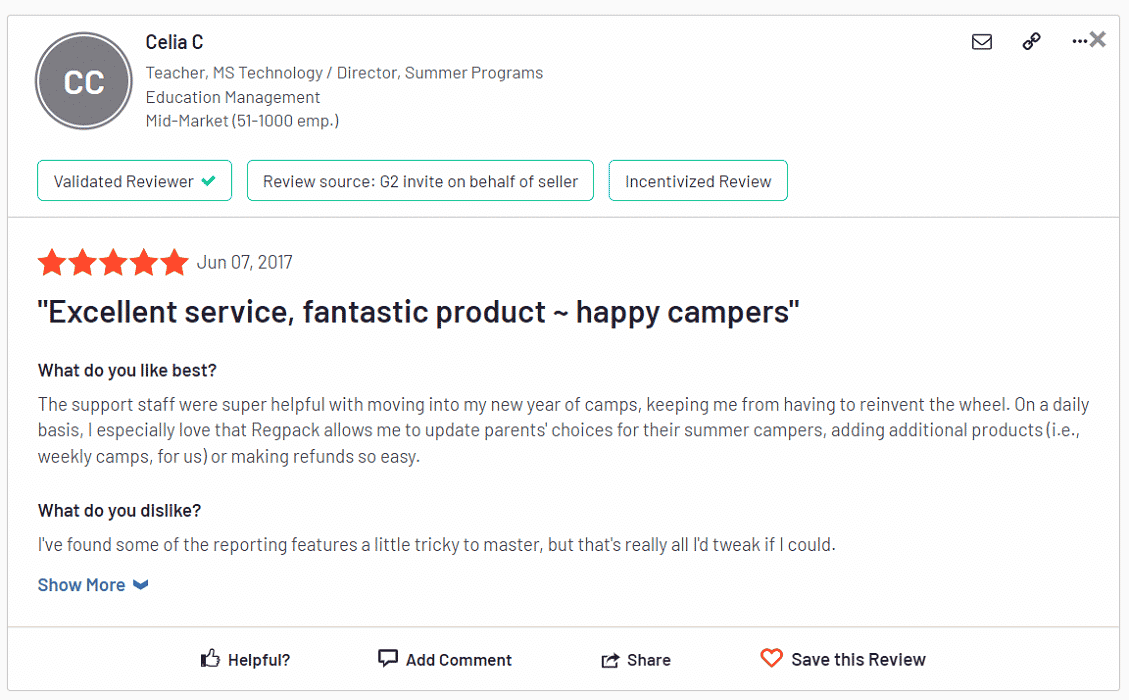
Source: G2
As you can see, the description says that the reviewer is a summer program director in a mid-market business, and her review has been validated.
So, if you’re in the same industry, chances are that this will also be a good fit for you.
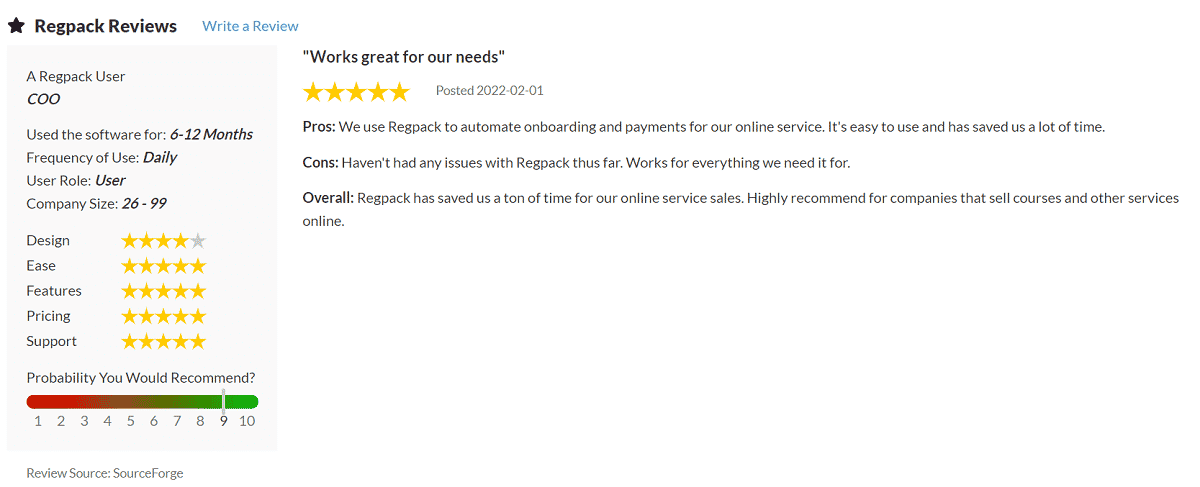
Source: SourceForge
Here’s another review, this time from SourceForge.
It has useful information that can help you decide if you’ve found the right event registration system for you, such as separate ratings for different aspects of the product (design, ease, support).
This is particularly helpful once you define your business needs, as we mentioned in the previous section, as it allows you to see if the product can help you meet them.
Focus on the Ease of Use
Now that you have a general idea of the kind of product that works best for your business, it’s time to see if it will work for your employees and customers.
After all, what’s the point of having cutting-edge technology if nobody’s going to use it?
A good event registration software should be simple to use, yet offer many functionalities to streamline a variety of processes.
As multiple team members will use it for different things, it’s a good idea to have everyone test it.
For instance, if the system works great for registrations, but not so well for reporting, then it might be best to look for another solution.
Buying a system that only meets some of your needs means that you will need to spend money on additional software solutions for reporting.
Moreover, your team will lose time moving data from one system to another and struggle with compiling and analyzing data from different sources.
On the other hand, good software will be intuitive, easy to navigate, and meet the needs of your entire team, as well as make the registration as simple as possible for participants.
You want as few obstacles as possible for your team to enable them to do their job quickly and efficiently and as few obstacles as possible for prospective attendees to increase the chances of registering.
Remember that the new system shouldn’t be too complicated for your team to learn. Otherwise, they’ll feel overwhelmed and have no motivation.
The best way to check how easy a system is to use is to schedule a demo by a qualified expert, who can explain all the features, and then request a free trial to see how it works in practice.
Research by PWC has shown that workers in the USA are willing to spend 12 hours per month learning new technology, so this is a good reference point of how much time your workers should spend on getting acquainted with the new software.
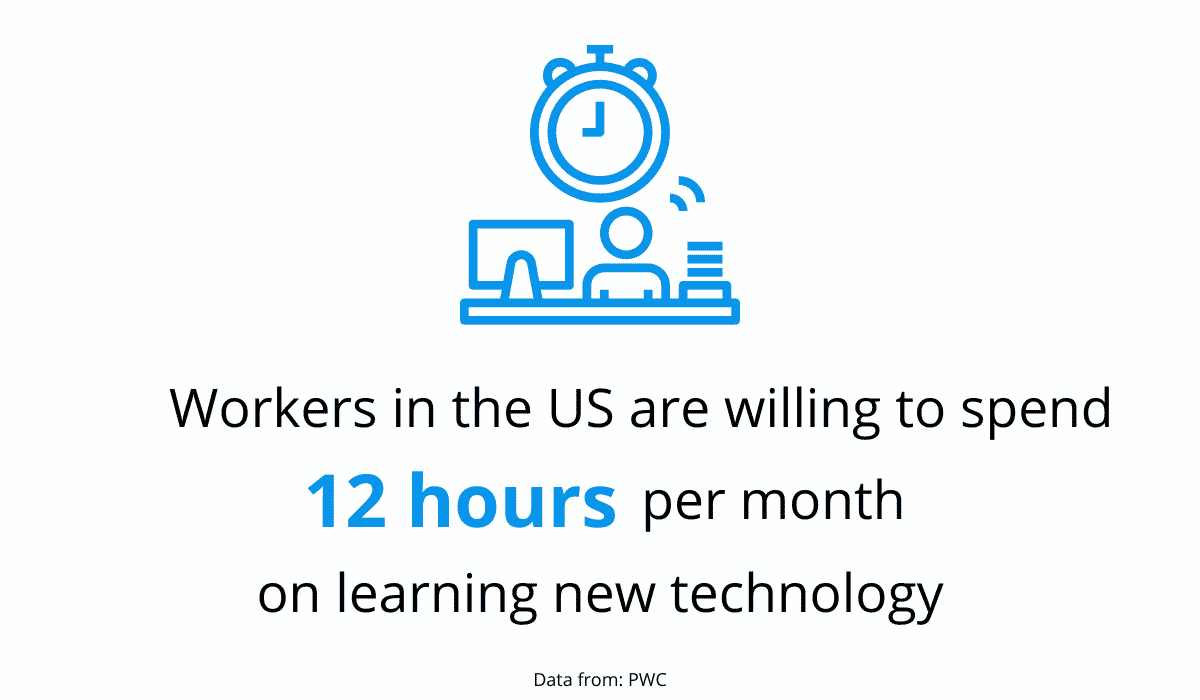
Source: Regpack
It’s best to have short training sessions each day. That way, they’ll learn continuously and practice daily, making them less likely to give up or forget what they learned last.
Opt for a Mobile Adaptive System
A site that adapts to a small screen is a must nowadays, when nearly 60% of people worldwide browse the Internet on their phones.
In fact, users have gotten so used to their smartphones that, according to Think with Google, 50% of people will use a website less if it isn’t mobile-friendly, even if they like a business.
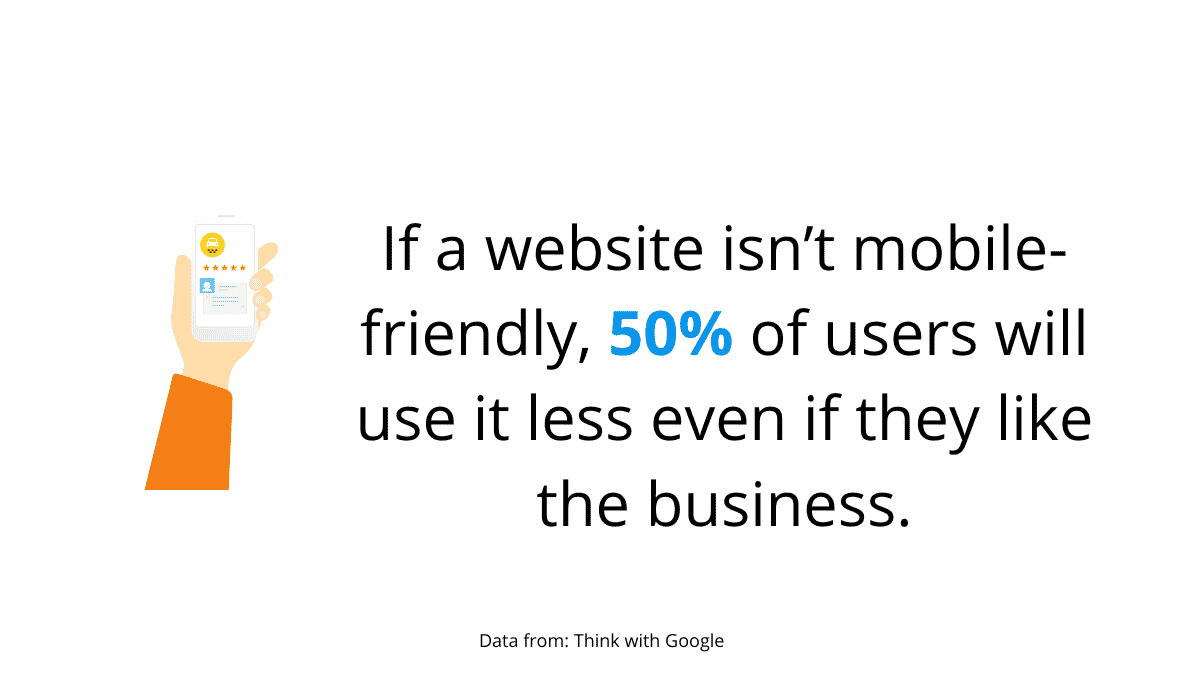
Source: Regpack
It follows that a system that can adapt to mobile devices is a necessity rather than a choice.
Allowing users to access all options and have the same experience on various devices will increase your credibility.
Users who interact with your website on their computer get a certain impression, which they expect will extend to the mobile version.
If they open your website and the text is all over the place, they can’t click on the registration button because it’s too small.
If the pop-up prevents them from seeing anything, they’ll become too frustrated to care about your event.
Making a mobile-friendly website won’t just make your page visitors happy—it’ll make Google happy, too. Mobile-friendly websites rank better in Google’s search results, which means potential clients will be more likely to find you, and, therefore, more likely to register for your event.
Finally, content from mobile is easier to share with others.
Think about it, if a client opens your website on their phone, they can send a link or a screenshot to someone they know who might be interested in Messenger, WhatsApp, or any other app they use for communication.
As this is much more difficult to do on a computer, people probably won’t bother at all, which means you lose prospective attendees.
Pay Attention to Security
Customers are increasingly concerned about how companies use their sensitive information online.
Their concerns aren’t unfounded: Security Metrics data suggests that 74% of companies didn’t encrypt their clients’ credit card information in 2020.
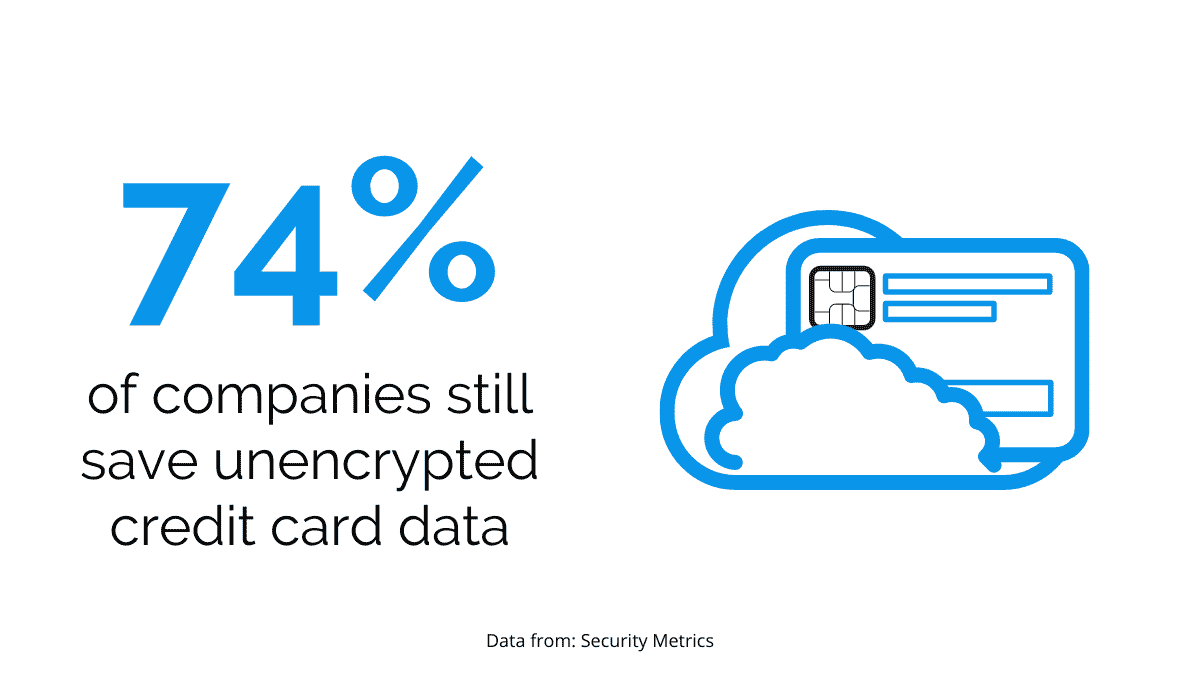
Source: Regpack
This is why you should carefully look into the security practices of the event registration systems you consider investing in.
An SSL certificate that enables an encrypted connection is an essential feature when accepting online payments.
Encryption will make transactions secure and prevent data theft, and it’s important even if you think that there’s no chance of hackers attacking your small business.
As John Turner of SeedProd LLC says:
“A lot of small businesses may overlook security because they think they won’t be a target, but small businesses are often the most targeted when it comes to credit card breaches. So make sure to get an SSL certificate for your site. It will protect your website and your customers’ valuable information.”
There are also various international and country-specific security standards and protocols that a good system should follow, for instance, the EU’s General Data Protection Regulation (GDPR) or PCI-DSS standards.
Security and privacy go hand in hand so, in addition to knowing that the connection is secure, customers need to be reassured that their data is kept private.
A good event registration system should have an elaborate privacy policy explaining in detail how user data is collected, which tools are used for it, and how the data is processed and stored.
If any changes are made, users should be promptly informed of what will happen and why.
When users see that their security and privacy are a priority, they’ll feel more at ease because they’ll know that the company takes their job seriously.
They will trust and respect your business and won’t hesitate to give you their payment details.
Look For Good Tech Support
Issues are bound to arise even when using the best software, so it’s essential to have access to good tech support.
Capterra found that poor support was the #2 reason for customer dissatisfaction with event management software.
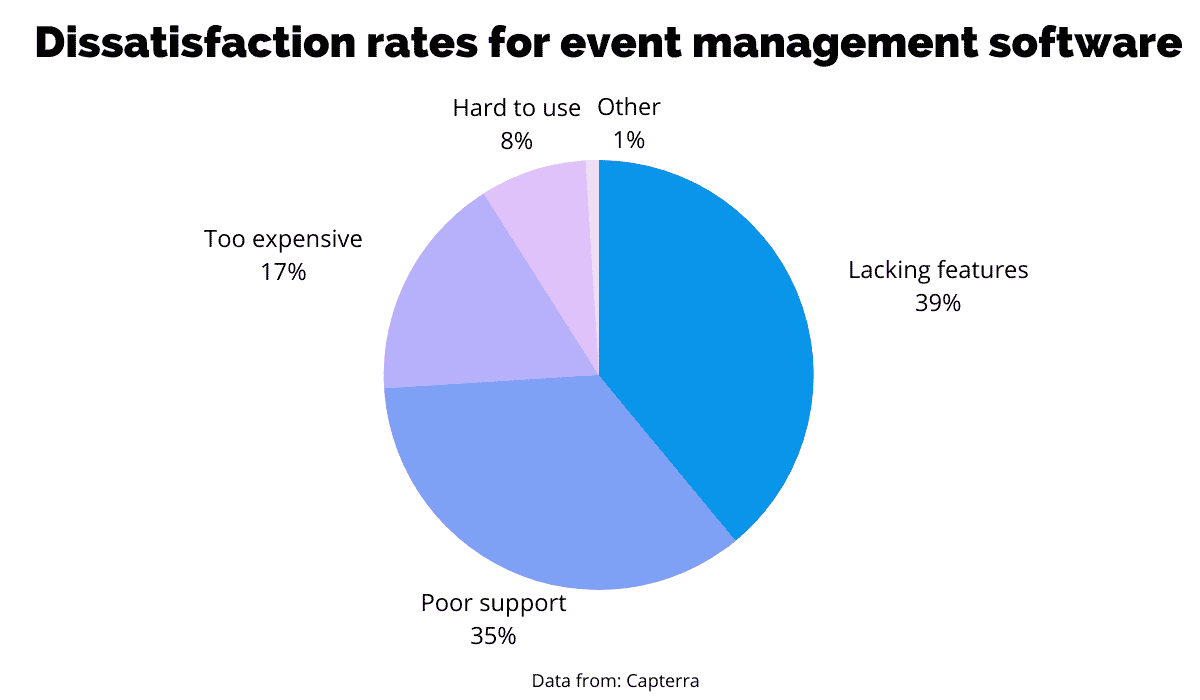
Source: Regpack
Learning new technology is hard, so your employees need to feel that they can ask questions and be confident that they’ll get an answer from a qualified professional.
That’s why you need to inquire about support options beforehand.
Endless Events warns that both big and small companies struggle with this: big ones provide excellent customer service, but they have so many clients that there’s no guarantee that they’ll be able to give you the attention you deserve.
On the other hand, smaller companies will have a more personal approach, but they probably don’t have enough staff to be available 24/7.
Another crucial thing to inquire about is the method that they use to provide support. Your employees learn differently, so they’ll require clarifications using different means.
Some will do fine just reading an email, while others won’t have the faintest idea what’s wrong until a technician comes and shows them how to eliminate the problem.
Regpack is a prime example of how setup and onboarding should be done: a dedicated project manager sets everything up, a training team teaches your team members how to use it, and their support team is available whenever you need it.
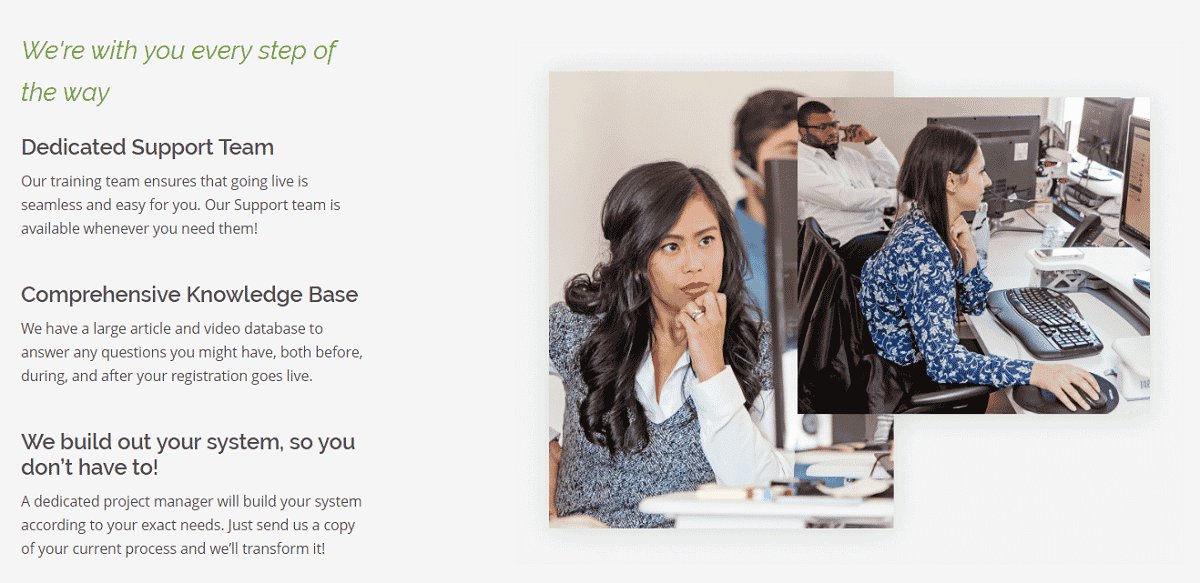
Source: Regpack
Moreover, they offer one-on-one support and a video database containing tutorials and answers to any questions you might have.
Conclusion
Choosing the right event registration system for your events is a daunting task.
You need to opt for one that’s simple to use, secure, and makes prospective attendees more likely to find you and ensure that it helps your employees, which is no small feat.
With the help of our tips and some careful planning ahead, you’ll be able to find one that ticks all the boxes and helps you sell out each event.


















